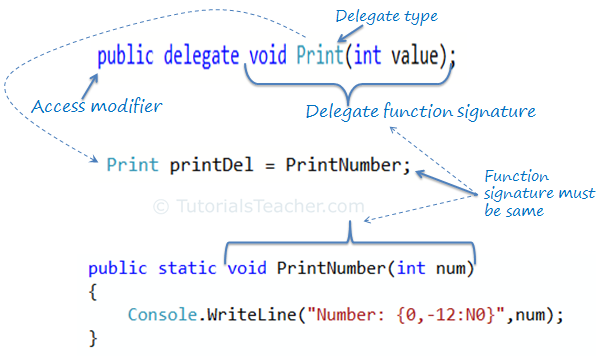C# Delegate:
A function can have one or more parameters of different data types, but what if you want to pass a function itself as a parameter? How does C# handle the callback functions or event handler? The answer is - delegate.
A delegate is like a pointer to a function. It is a reference type data type and it holds the reference of a method. All the delegates are implicitly derived from System.Delegate class.
A delegate can be declared using delegate keyword followed by a function signature as shown below.
delegate syntax:
<access modifier> delegate <return type> <delegate_name>(<parameters>)
The following example declares a Print delegate.
Example: Declare delegate
public delegate void Print(int value);
The Print delegate shown above, can be used to point to any method that has same return type & parameters declared with Print. Consider the following example that declares and uses Print delegate.
Example: C# delegate
class Program
{
// declare delegate
public delegate void Print(int value);
static void Main(string[] args)
{
// Print delegate points to PrintNumber
Print printDel = PrintNumber;
printDel(100000);
printDel(200);
// Print delegate points to PrintMoney
printDel = PrintMoney;
printDel(10000);
printDel(200);
}
public static void PrintNumber(int num)
{
Console.WriteLine("Number: {0,-12:N0}",num);
}
public static void PrintMoney(int money)
{
Console.WriteLine("Money: {0:C}", money);
}
}
Output:
Number: 10,000
Number: 200
Money: $ 10,000.00
Money: $ 200.00
In the above example, we have declared Print delegate that accepts int type parameter and returns void. In the Main() method, a variable of Print type is declared and assigned a PrintNumber method name. Now, invoking Print delegate will in-turn invoke PrintNumber method. In the same way, if the Print delegate variable is assigned to the PrintMoney method, then it will invoke the PrintMoney method.
The following image illustrates the delegate.
 delegate in C#
delegate in C#
Invoking Delegate:
The delegate can be invoked like a method because it is a reference to a method. Invoking a delegate will in-turn invoke a method which id refered to. The delegate can be invoked by two ways: using () operator or using the Invoke() method of delegate as shown below.
Example: Invoking a delegate
Print printDel = PrintNumber;
printDel.Invoke(10000);
//or
printDel (10000);
Number: 200
Number: 200
Delegate as a parameter:
A method can have a parameter of a delegate type and can invoke the delegate parameter.
Example: Delegate Parameter
public static void PrintHelper(Print delegateFunc, int numToPrint)
{
delegateFunc(numToPrint);
}
In the above example, PrintHelper method has a delegate parameter of Print type and invokes it like a function:delegateFunc(numToPrint).
The following example shows how to use PrintHelper method that includes delegate type parameter.
Example: Delegate parameter
class Program
{
public delegate void Print(int value);
static void Main(string[] args)
{
PrintHelper(PrintNumber, 10000);
PrintHelper(PrintMoney, 10000);
}
public static void PrintHelper(Print delegateFunc, int numToPrint)
{
delegateFunc(numToPrint);
}
public static void PrintNumber(int num)
{
Console.WriteLine("Number: {0,-12:N0}",num);
}
public static void PrintMoney(int money)
{
Console.WriteLine("Money: {0:C}", money);
}
}
Output:
Number: 10,000
Money: $ 10,000.00
Multicast delegate:
The delegate can points to multiple methods. A delegate that points multiple methods is called a multicast delegate. The "+" operator adds a function to the delegate object and the "-" operator removes an existing function from a delegate object.
Example: Multicast delegate
public delegate void Print(int value);
static void Main(string[] args)
{
Print printDel = PrintNumber;
printDel += PrintHexadecimal;
printDel += PrintMoney;
printDel(100000);
}
public static void PrintNumber(int num)
{
Console.WriteLine("Number: {0,-12:N0}",num);
}
public static void PrintMoney(int money)
{
Console.WriteLine("Money: {0:C}", money);
}
public static void PrintHexadecimal(int dec)
{
Console.WriteLine("Hexadecimal: {0:X}", dec);
}
Output:
Number: 1,00,000
Hexadecimal: 186A0
Money: $ 1,00,000.00
As you can see in the above example, Print delegates becomes a multicast delegate because it points to three methods - PrintNumber, PrintMoney & PrintHexadecimal. So invoking printDel will invoke all the methods sequentially.
Delegate is also used with Event, Anonymous method, Func delegate, Action delegate.
Further reading:
Points to Remember :
- Delegate is a function pointer. It is reference type data type.
- Syntax: public delegate void <function name>(<parameters>)
- A method that is going to assign to delegate must have same signature as delegate.
- Delegates can be invoke like a normal function or Invoke() method.
-
Multiple methods can be assigned to the delegate using "+" operator. It is called multicast delegate.